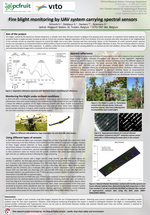Fire blight monitoring by UAV system carrying spectral sensors
Fire blight, caused by the bacterium Erwinia amylovora, is already more than 30 years present in Belgian fruit growing areas and poses an important threat leading each year to economic losses in apple and pear orchards as well as in fruit tree nurseries. Regular inspections of the fruit orchards, fruit tree nurseries and other host plants in the neighborhood of the orchards remain an important measure to control fire blight, but is very labor intensive and time consuming. Hence, in the framework of a joint research project spectral sensors are mounted on an Unmanned Airborne Vehicle (UAV) or drone to test their potential for the monitoring of fire blight infections on pear. The use of drones allows to monitor larger areas than the current field inspections. In addition, unlike the more traditional remote sensing platforms as manned aircraft and satellites, drones offer a higher flexibility and extremely detailed images with a resolution of one centimeter.Documents

|
Fire blight monitoring by UAV system carrying spectral sensors () poster |
Details
- Activity type
- Participation in scientific conference
- Activity work package
- Reduction in pesticide residues
- Activity number
- Pcfruit-WP3-a7
- Activity contact
- Serge Remy, Proefcentrum Fruitteelt vzw,
Fruittuinweg 1
3800 Sint-Truiden, Belgium
Tel.: +32 (0)11 69 71 50
Email: [email protected]
Website: www.pcfruit.be
- Activity partner
- Proefcentrum fruitteelt vzw
- Activity country
- Spain
- Last edit
- 03-10-2017

The EUFRUIT thematic network has received funding from the
European Union's Horizon 2020 research and innovation programme
under grant agreement No 696337.
European Union's Horizon 2020 research and innovation programme
under grant agreement No 696337.